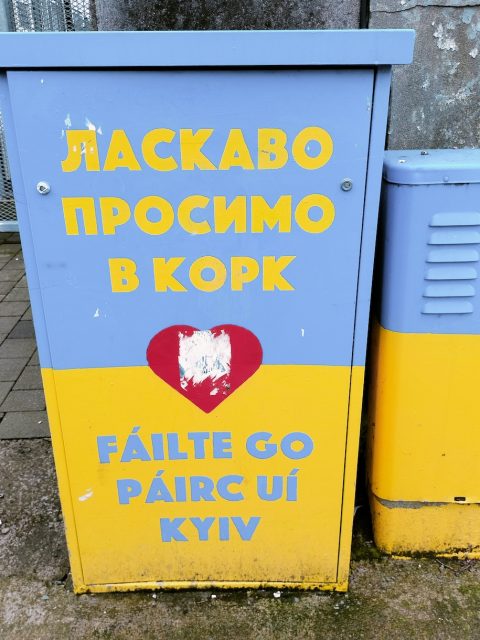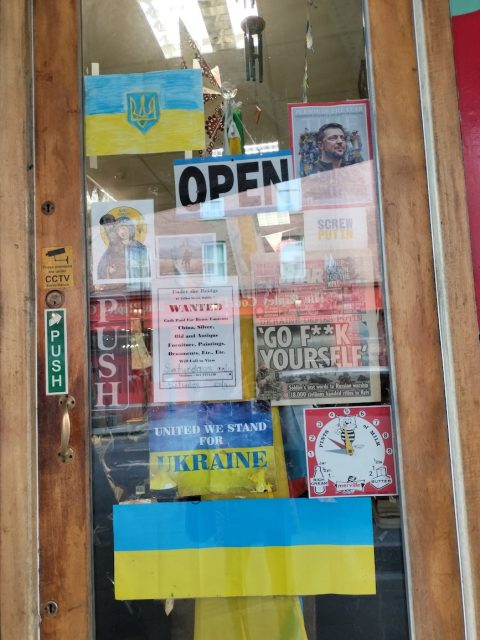Before the full-scale Russian invasion, it was common to hear comparisons between Ukrainian and Irish history. The Irish mentality, their struggle for independence, and the occupation of Northern Ireland by Britain bear similarities to Ukraine’s experiences. It’s not surprising that a country 3,000 km away warmly welcomed Ukrainians from the first days of the full-scale war, even removing visa requirements. I was fortunate to visit Ireland for the first time in the spring of 2022 and then lived there for three months during the summer of 2022. In the spring of 2024, I returned for three weeks to see how the lives of Ukrainians on the Emerald Isle have evolved and whether the Irish attitude towards the war in Ukraine has changed.
«Go home»
According to the Central Statistics Office of Ireland, there are currently more than 100,000 Ukrainian refugees in the country. Considering that Ireland is about the size of Kyiv and its region, with a population of just over 5 million, this is a rather significant number. I saw firsthand how local organisations and volunteers adapted to the situation in the early months as Ukrainians continued to arrive, even though official Dublin had neither a procedure for issuing temporary protection (the main document that allows Ukrainian refugees to stay in EU countries) nor an understanding of where and how to accommodate the new arrivals. However, empathy and understanding were evident, from informal communication at the border to interactions with Red Cross employees and the Migration Service handling refugees. Of course, the human factor cannot be ignored.
By the summer of 2022, the number of Ukrainians in Ireland continued to grow rapidly. Ireland’s challenge lies not only in its size but also in the enduring housing crisis that has affected its real estate market for many years. The issue is not only the high rental prices but also the limited availability of housing. Both Ukrainians and the Irish faced this problem. Unfortunately, the current government has offered little to no solutions to this artificial crisis.
Against this backdrop, I noticed an interesting phenomenon that might warrant a separate investigation. Since the full-scale invasion began, the number of groups like “Ukrainians in Dublin” and “Ukrainians in Ireland” has grown on social media. Wherever Ukrainians found themselves, these groups emerged to address various issues. People seek advice, look for housing and jobs, and resolve different kinds of problems within these groups.
While observing several such groups, I noticed the same people with Irish names and profiles, either without photos or with newly created pages. These individuals (or bots) followed a specific pattern: they commented claiming that Ukrainians do not work, contribute nothing, and should no longer be accepted as that there is no more space left for the Irish themselves. They often wrote, “Go home,” and stirred up scandals in the comments, portraying Ukrainians in the most negative light. On one occasion, another user and I decided to check the account of one such “Irish woman.” We noticed that all her posts were of the same content and were all in Ukrainian groups. I cannot definitively say that these are Russian provocations, but it seems very likely that someone benefits from creating such an image.

Photo: Kateryna Gladka
«We understand you»
During my trip to Ireland, I stayed in Dublin and visited the museum dedicated to the classic Irish writer James Joyce. Several rooms feature translations of Irish authors into various languages, including Joyce’s famous novel “Ulysses.” A museum employee showed me all the copies of Terry Pratchett and James Joyce in Ukrainian, which sparked a conversation. Her parents came from Northern Ireland, so she knew a lot about her country’s history and could relate to the Russian full-scale invasion through analogies. She constantly helps Ukrainians with donations, contacts, or job searches. She said she feels a close connection to it all. “We understand you,” she told me. “Even with all the methods empires used on their lands, they can’t be compared to Russian methods.”
The woman also noted that Ireland had relied on many services, including gas from Russia, but with the full-scale invasion, many views and economic approaches were revised. In Ireland, based on my subjective observations, the narrative that the problem is only with Putin doesn’t work. The Irish, looking through their own prism and experiences, understand better why empires aim to destroy other nations and why Russia cannot exist without Ukraine.
“There is no part of Ireland where there are no Ukrainians. This also transforms our nation and the interactions among people and cultures. I see positive aspects in this,” she concluded our discussion.

Photo: Kateryna Gladka
Female solidarity
During my trip to Ireland, I explored the western part of the country, including the charming city of Killarney. Nestled within a vast reserve adorned with lakes, mountains, and unspoiled nature, Killarney offered a truly serene retreat. I lodged in a house where several other tenants rented rooms, and we shared a communal kitchen. One evening, I struck up a conversation with a young woman, a teacher from Paris (who preferred not to disclose her name for privacy reasons).
As is often the case when people discover I’m from Ukraine, our conversation unfolded into a lengthy exchange lasting several hours. Over the years of enduring the Russian invasion, I’ve found myself interacting with colleagues, acquaintances, and strangers from various corners of the globe, so I’ve grown accustomed to certain questions that inevitably arise. This familiarity stems from Ukrainians adapting to life amidst conflict, as there’s simply no alternative. Even for those who have relocated to safer countries, the ties to their homeland, its events, and their families endure. However, comprehending the realities of Ukraine can prove challenging for those fortunate enough to dwell in relatively secure environments. This is only natural.
I came to realise that genuine connection—the kind that fosters dialogue and understanding—is rooted in empathy. It’s a compassion that transcends ethnic or religious affiliations, grounded instead in a universal concern for fellow humans. On a personal level, we can empathise, support, and stand together undivided.
This young woman posed several questions, and, of course, the one which was commonly asked in some Western countries: Do Russians genuinely back the war, or is it solely orchestrated by Putin’s personal aggression?
I wish I could naively say that all 140 million Russians are just hostages of Putin’s regime, but that’s simply not true. The actual situation on the ground varies, but a considerable portion of the Russian population indeed grants its support to the brutal Russian invasion, whether out of fear, propaganda, or ideological convictions. What’s crucial to me is that, despite the gratitude Ukrainians hold for Western allies, volunteers, and all who offer aid, no one understands the Russian mindset quite like Ukrainians do. We’re intimately familiar with the language and have coexisted with a neighbour whose ruthless methods haven’t changed throughout our history. Therefore, Ukrainian testimony isn’t just about resentment or rejection of Russians; it also reflects a deep understanding of their mentality. This understanding extends far beyond notions of “high culture.” The minority that comprehends and opposes the invasion either resides outside Russia or lacks significant influence. Sometimes, they resort to old narratives of “great culture” and the “mysterious Russian soul,” which view communication as hierarchical rather than egalitarian. Thus, my response was nuanced.
Another simple but strong question she asked was: how do you live and spend your day when missiles can strike when there are alarms? The young woman was addressing another young woman of her generation: how do you live? This made me reflect on how we manage to live our daily lives. There can be no unequivocal black-or-white answer. But it definitely means choosing life every time, listening to intuition, supporting each other, donating and acting more out of love for our homeland than out of anger and hatred towards the enemy (although there are plenty of reasons for that every day).
After a while, another young woman from Liverpool, who wished to remain anonymous for privacy reasons, joined our conversation. She showed a keen interest in our discussion, revealing her close connection to Ukraine. She shared that she had experienced a traumatic sexual incident in the past, which took years to heal from, leading her to explore various coping mechanisms. Eventually, she chose to turn her personal journey into a profession, helping others navigate similar challenges.
Liverpool hosted the Eurovision Song Contest in 2023 when Ukraine, due to the war, couldn’t host the event. Many refugees from Ukraine reside there as well. For my conversation partner, immersing herself in Ukrainian culture through its space, stage, and cuisine was a truly profound experience. Among the women she works with are refugees from Ukraine who have endured various traumatic experiences. I was deeply impressed by her attitude, love, empathy, and stance against modern imperialism.
She drew attention to completely different aspects, for instance, that being European is not about declarations or formal statements but a way of life and thinking. In this sense, Ukrainians have nothing to prove; they demonstrate it through their daily lives and by acting as the shield for the rest of the European continent. Therefore, “Be brave like Ukrainians” isn’t just a slogan.
Overall, the solidarity and genuine interest of both women allowed me to see from within the great work we have already done as a nation, as a living organism, and how much we have to share. Often, this is such a depth of life that it is difficult to describe without having experienced this life on the edge.
Ukraine’s faithful partner
Despite the significant influx of refugees and the potential decrease in the number of Ukrainians returning home (the Irish government is considering providing financial assistance for Ukrainians unable to afford the trip back), Ireland remains a steadfast ally to Ukrainians. The Ukrainian diaspora has now become one of the largest on the island, bringing about changes in Irish society and expanding perceptions of Ukraine as a fascinating, culturally, and historically rich nation with a wealth of experiences that can contribute to the European community.
Furthermore, Ukraine’s historical context encompasses not only enduring some of the most brutal totalitarian regimes—originally the Russian Empire, followed by the Soviet Union, and now modern Russia—but also a rich history of multiculturalism and interethnic dialogue. This diverse background positions Ukraine as a significant contributor to the broader European discourse, enriching it with perspectives and lessons that are becoming increasingly pertinent in today’s interconnected world.

